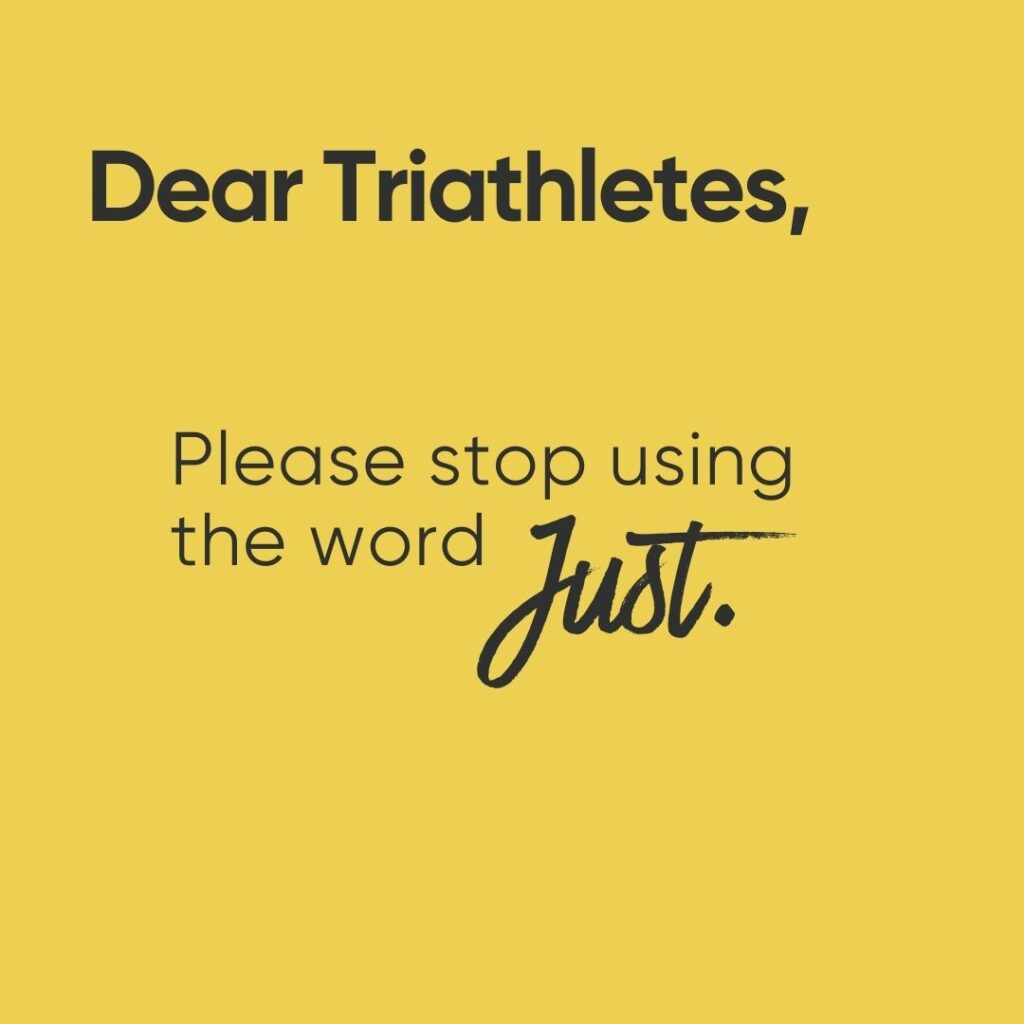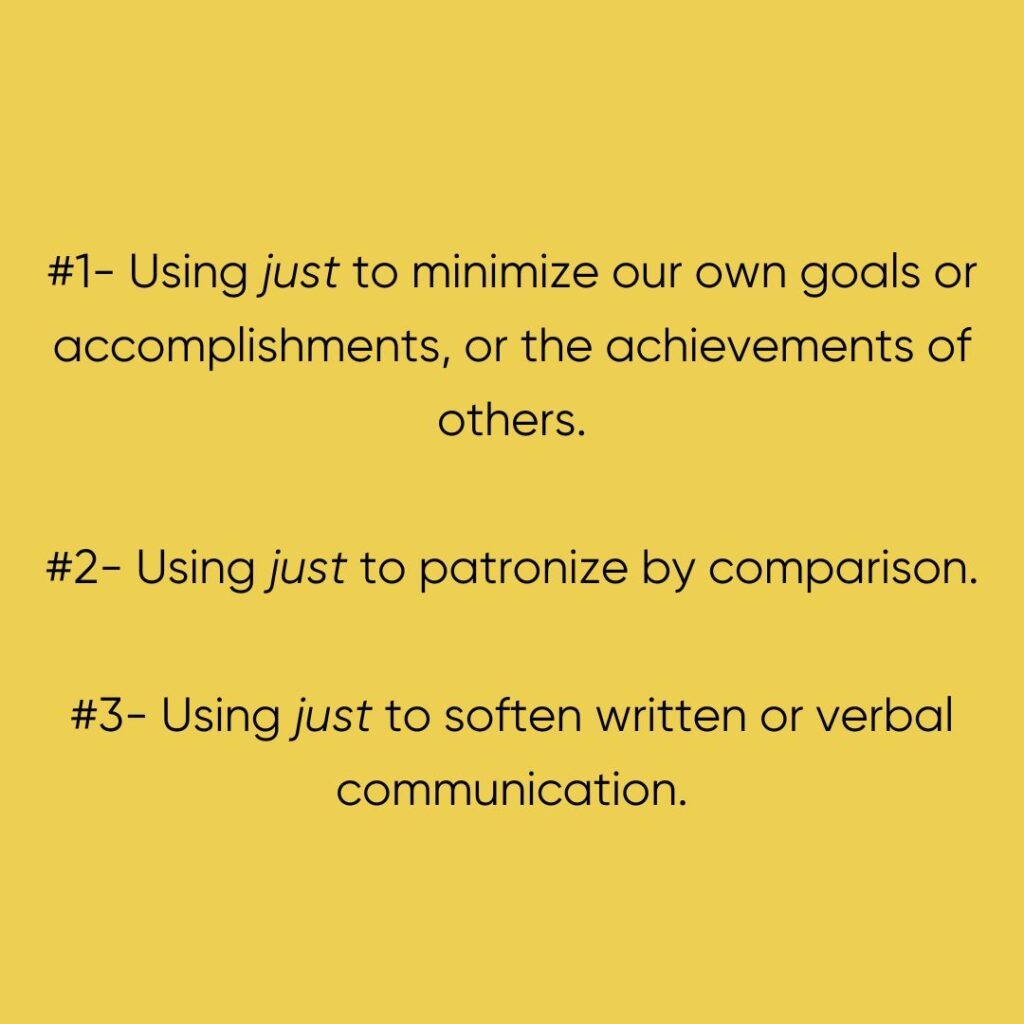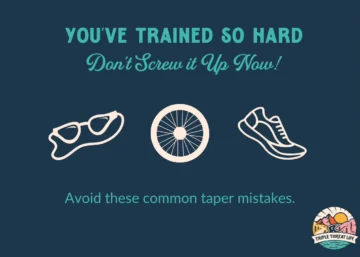
Words are powerful. Even so, I’m always surprised at the effect an insignificant, little word like “just” can have on your (or someone else’s) mindset, attitude, and self-worth.
Take a look at the following phrases and see if you’ve heard them before:
“It’s just a sprint triathlon.”
“It’s just a 5K.”
“It’s just a half-Ironman.”
(Or the similar, but equally annoying.)
“Just wait until you do an Ironman.”
“Just wait until you do a century.”
“Just wait until you get married, have kids, start a business, ect.”
There really isn’t any problem with the word “just.” It comes from the Latin justus, meaning law or right and it’s used to describe fairness and morality.
But I’m talking about using it as a minimizing, passive aggressive adverb that makes people feel worse about themselves and what they’ve accomplished.
Check out three common ways we use this word and why athletes (and really all humans) should stop using the word “just.”

1. Using “just” to minimize our own goals and accomplishments, or the achievements of others.
When we say things like “It’s just a sprint” or “It’s just a 5K,” we’re minimizing the importance of that event.
Consider a scenario where Athlete A is very excited about competing in a sprint triathlon. She’s been preparing for weeks and is a bit nervous, so she confides in Athlete B (someone who’s done many long distance races). Athlete B says, “Don’t worry so much, it’s just a sprint.”
What Athlete B is really saying is, “I’ve done races much longer and harder than that. A sprint is small potatoes, easy, no big deal.”
While the preparation required for short-course is certainly different than long course, that doesn’t automatically mean it’s easy. Sprints are freaking hard! I’d rather do a 70.3 than a sprint, but I’m more of a long course girl. (It’s something we’re working on, but I digress.)
Whether it’s a sprint triathlon or a 5K, short course racing is hard, fast, intense and it hurts. It really can’t be compared to long course racing, because it’s an entirely different thing. We know this, but that’s not the point, is it.
The bottom line is that what Athlete A thinks about her goal and what Athlete B thinks about the goal are two different things. But it’s important to recognize that one athlete’s Ironman might be another athlete’s sprint, so stop judging.
On the other hand, we might use the word “just” when preparing for our own race. I’ve done it myself.
It’s a way to minimize the expectations we’ve set for ourselves, or the expectations of others. If it’s “just a 5K,” or a sprint, a half-Ironman, or whatever, then there’s less pressure to perform.
If we don’t take a risk by setting a goal, then we can’t be disappointed. It’s a self-protection mechanism.
Takeaway: Don’t use “just” to minimize goals or accomplishments because you think something isn’t hard enough, long enough, or worthy of praise. If it’s something you think is worth doing (which you do or you wouldn’t be doing it) then give it (and you) the respect it deserves.
2. Using “just” to patronize by comparison
This is a big pet peeve of mine.
Consider these scenarios:
- Excited about finishing your first 70.3? “Just wait till you do an Ironman.”
- Proud of your hard-earned half marathon time? “Just wait till you do a marathon.”
- Thrilled about getting engaged? “Just wait till you’re married.”
- Busy with your new business? “Just wait till you have kids.”
Stop. Doing. This.
It’s patronizing and unhelpful. It’s simply a reminder that I’ve done something that you haven’t. It’s like a 10-year-old taunting, “I know something you don’t know…”
“You just wait…” actually means “Your struggles pale in comparison to my own, and your accomplishments are nothing compared to mine. It’s going to get much harder, but instead of giving you advice for how to prepare, I’m going to ominously hint at things to come while asserting my own superiority.”
When people say this to me, I typically respond with “No thanks. I won’t be waiting for anything. I’m living my life right now.”
Feel free to use that one. 😉
Takeway (for people who do this): Let people enjoy good things. Stop comparing their experiences to your own. You are not the benchmark by which all others need to be measured.
3. Using “just” to soften written or verbal communication
One of my first jobs out of college was working with an editor who was a bit… intimidating. Send an email at a bad time and you’d receive a sharp response or outright dismissal. Not respond to an email in time and you’d get an angry phone call. He was also a man.
That experience shaped how I started using the word “just.” I later learned it’s very common among women in the workplace. But men do it too.
I’ve heard “just” be described as a “politeness marker” or “social lubricant.” It’s used to soften what we say so it’s not as direct and less assertive.
“I just wanted to see if you had a chance to look at…”
“I’m just checking on…”
“Just wondering if you thought…”
It’s another way of saying, “I’m sorry for bothering you.”
But you don’t need to feel sorry for making a request. Be polite and respectful, but don’t apologize for doing your job.
I work for myself now, but I still try hard to eliminate “just” from my emails.
Instead of: “I’m just wondering if you received the invoice for my last article.”
I say: “My article is attached, as well as an invoice. Requesting confirmation of receipt.”
Instead of: “I’m just checking to see if you had time to look at these topics.”
I say: “Do you want to use any of these topics?”
After failing big time at this once, I’ve learned it’s important to set expectations up front. Honestly, it makes a huge difference in how you’re perceived, especially when someone can’t see your face or hear your voice.
I used this method when working with a new publication last year, and the difference in how I was treated was dramatic. Also, they still pay me the most out of all the platforms I work with.
Takeaway: Be polite and professional, but also assertive. Don’t apologize for doing your job.
So my friends, when it comes to using the word “just,” please just stop.


